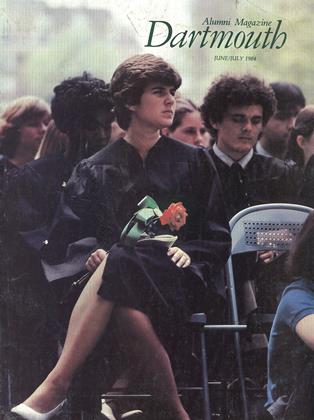C. Dwight Lahr, associate dean of the faculty for the sciences, dean of graduate studies, and an associate professor of mathematics and computer science, has been named the seventh dean of the faculty of the arts and sciences at the College.
Lahr sees the challenges of his new post as two-fold and related. First is "to maintain the strength of the faculty in research and in teaching" and second is "to maintain the quality of the undergraduate and graduate curriculum." He said of the latter, "This is what Dartmouth is all about/' and then added, "But unless we have the best possible faculty we will fail in this."
He spoke of some of the difficulties attendant to cultivating "the best possible faculty." He explained that the emphasis on faculty stengths "in research and in teaching" is "purposeful."
"We try to recruit research-oriented teaching faculty," he said. "We look for faculty who are on the forefront of their fields, but who, at the same time, have a strong interest in teaching." He said this makes the job of recruitment harder than at the typical college or university, where there is generally an emphasis either one way or the other. But, he added, this is "what sets Dartmouth apart from her sister institutions."
This focus on dual faculty strengths is reflected in the tenure process at the College, Lahr explained. Only faculty members who are "very, very good in both" are given tenure. "We don't tenure people who are extremely good in one to the exclusion of the other," he said. "That's why I came here and why other faculty people come here. If we give the world this message, we'll be able to recruit people who share this vision."
Other factors Lahr noted as likely to make faculty recruitment a difficult task over the next several years are that the number of qualified applicants is decreasing and the competition for them is increasing. He explained that fewer students are going on to graduate school, making the pool for recruitment smaller. "And the pool in the sciences is even smaller," he added, "because of competition from industry and from major research universities."
Lahr feels that the faculty is already "very, very strong." He said the task on that front will be "to replace retirees with people just as good, if not better, in terms of the eighties." The focus on the curricular front, he said, will be "to maintain and enhance" current offerings. The recent modifications to the academic calendar, requiring enrollment during sophomore summer and the entire senior year in addition to all freshman year, afford many opportunities for curriculum development, Lahrfeels.
He also sees a potential for the computer to have a great impact on college teaching. He noted that many faculty members even in the humanities who are being recruited are asking about Dartmouth's computer system. This is an arena in which Lahr himself is well qualified. The picture on page 30 shows him explaining a pantograph-like device he and another math- ematics faculty member have developed for use with the Macintosh computer. The device will facilitate reproduction and scaling of diagrams or drawings for classroom and other uses.
Lahr's area of research and specialization is in the fields of Banach algebras, functional analysis, and harmonic analysis. To cast them in lay terms, he described the latter, for example, as another way of looking at the patterns generated by musical notes analyzing the sound waves by decomposing them into their harmonic parts and then reconstructing them to get a composite.
As dean, Lahr succeeds Hans Penner, a professor of religion, who is completing a four-year term and will return to teaching after a year's leave. Lahr joined the Dartmouth faculty in 1975 and has held the posts of dean of graduate studies and associate dean of the faculty for the sciences since 1981.
A 1966 graduate of Temple University, he earned his master's and doctoral degrees in mathematics at Syracuse University in 1968 and 1971. He worked as a teaching assistant at Syracuse and spent summers during his graduate studies doing computer programming and systems analysis. He worked from 1971 to 1973 as a mathematician in the traffic research department at Bell Laboratories, solving telephone traffic network problems using queueing theory and numerical analysis. While on a leave of absence from Bell he taught mathematics as a visiting faculty member at Savannah State College in Georgia in 1973-74 and at Amherst College in 1974-75. The next year he came to Dartmouth as an assistant professor of mathematics.
Lahr has also published research papers in many leading mathematical journals and has served on a number of College committees, including the Committee on Organization and Policy, which he chaired. He is currently a member of the Council on Sponsored Activities, the Council on Graduate Studies, and the Academic Deans Council.
 View Full Issue
View Full Issue
More From This Issue
-
 Feature
FeatureProfessor John Stearns '16: Rara Avis Una
June | July 1984 By Eddie Chamberlain '36 -
 Feature
FeatureCreativity: The Open Dance at Dartmouth
June | July 1984 By Prof. Blanche Gelfant -
 Feature
FeatureWearers of the Green
June | July 1984 By Jim Kenyon -
 Feature
FeatureThe Best Part of My Academic Life Here
June | July 1984 -
 Feature
FeatureMaking it Happen
June | July 1984 By Peggy Sadler -
 Feature
FeatureThe Quiet Good Man
June | July 1984 By Young Dawkins '72
Article
-
 Article
ArticleCOLLEGE GETS LARGE BEQUEST BY WILL OF LATE S. H. STEELE
February 1921 -
 Article
ArticleFROM THE UNDERGRADUATE CHAIR
February 1925 -
 Article
ArticleThanks
February 1993 -
 Article
ArticleCatching Up
SEPTEMBER 1999 By Casey Noga '00 -
 Article
ArticleAtten' Hut
Jul/Aug 2004 By Ed Gray '67 -
 Article
ArticleThe Pull of Rowing
Nov/Dec 2002 By JILL FREDSTON


